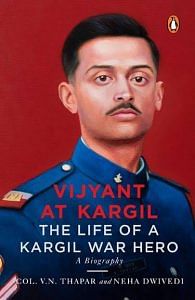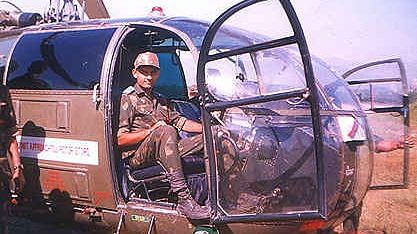In February 1999, helmet-wearing soldiers in grey jeeps and Casper’s trucks—reinforced with steel plates— were all over the region but locals paid them no heed. Robin’s [Captain Vijyant Thapar] battalion moved into the area of Kigam, a hotspot for operations. The companies were deployed to cover a vast area—Chak Natnusa, Kantapur, Madnan, Bodhbal, Kandi, Tarach and Tarats. He was thankful for the opportunity to train in Khrew. This was also when he spent all his time with the troops rather than with his fellow officers. When not at work, they would pass time listening to music. Robin’s favourites were songs from the war movie Border.
He loved clicking pictures too. One day, he took many pictures with his commanding officer in various poses. After some time, to his embarrassment, he discovered that there was no film in the camera! Virender became the target of his angry outburst on the phone. ‘Papa,’ he said angrily, ‘couldn’t you have loaded a film in the camera before giving it to me?’ Later, a new film was bought and they clicked many pictures of Robin in his uniform and patka. He stood in front of the camera and asked, ‘Do I look like a commando or not?’
From day one, they got busy patrolling, cordoning and searching, and conducting ambushes. Robin wrote a letter to his father describing life in Kupwara as tough, full of tension and daily challenges, with death lurking in the dark. They had to move with extreme caution, be alert and make sure they did not make the slightest noise. They changed their routes and time of going out frequently. In fact, by now Robin had grown a beard and had started calling himself ‘Sher Khan with a beard’ from his favourite children’s book The Jungle Book.
In a letter dated 3 April 1999, he wrote about an encounter in which about thirty bullets were fired at him during an operation. Anything could happen at any time, he wrote. In his reply, his father advised him to be focused on the ongoing operation and not be distracted in counting bullets! That day Robin had been ‘baptized under fire’. The dictum of infantry school that ‘a bullet fired by the enemy teaches one more than all the training manuals’ holds true in all instances.
The operations went on and on without any results, as the militants always gave them the slip. There had been nine contacts. Whenever a patrolling party sees or has a brush with a terrorist group, it is known as a contact. It doesn’t always result in action. Then, one day, news of militants in the area reached the headquarters, and a hasty plan was made. The boys had seen all this happen many times and had got used to the routine. They would receive information, men would be quickly assembled and briefed.
They would wait in ambush, lying there for hours, and come back without a thing. This time, Robin was already on a patrol with his platoon, and they were diverted from the west to an area where the group was to be intercepted. Maj Vivek with his troops closed in from the north, while another group with Mohit and Rautela moved in from the east to encircle the terrorists. They knew the area like the back of their hand. The operation went on for hours as the group and the force engaged in a cat-and-mouse game. They came close to the group as it crossed a stream some distance away. Electrified, Robin with his platoon was asked by Maj Vivek, who had reported a contact, to close in fast and reach a hut that was on a higher ground, like an island in the sea of flat paddy fields.
In the meantime, the terrorist group sensed a threat approaching from its left and quickly started moving eastwards. There was deathly silence, except for dogs barking in the distance. In the wee hours, the silence was shattered by the sound of a long burst of fire and a few more shots some distance away. Everyone was on high alert. It sounded as though there had been a kill. A few moments later, the radio crackled to life. There was a suppressed cheer as they learnt that they had shot at the terrorists and the operation had succeeded. One body was recovered and the blood trail leading towards the village revealed that two more had been wounded. Robin saw the terrorist lying in an awkward position. He was dazed. He had seen a man shot dead for the first time.
‘Is this what separates life from death—a moment, a bullet?’ he wondered. He stood there staring blankly, thinking these were men who had wanted to kill him.
The AK-47s were lying uselessly next to his hand. The tall man had received three hits, one of which had shattered his face. His long hair and clothes were drenched in blood. Robin had seen it all that day. The body was removed to the police station and the documentation completed. Meanwhile, Robin went after the wounded ones. But they had vanished.
Robin then reported another contact, and operations were launched with A and D companies. But after much combing, the operations were called off. Life went on in the same way after that, filled with more patrolling, more ambushes, more cordons and more frustration. Sometimes there were engagements, which resulted in ambushes and fedayeen killed. The terrorists were very well equipped, sometimes with night-vision and GPS devices, concentrated food items and walkie-talkies.
Often, there would be a period of inactivity. On 24 April 1999, a call was received, and once again an operation was launched. This time it was the Alpha Company with Maj Padmapani Acharya (Archie) leading, with one JCO and forty other ranks, and Robin, his second-in-command. There had been information of four terrorists hiding in a few huts in the remote village of Watankhai on the fringes of the Shalabat forest. Archie gulped down the last of his Old Monk, wiped his moustache and said, ‘So Robin, this time the bastards are going to get it. What do you say?’
‘We will get them, and, Sir, make sure I get my medal,’ said Robin.
‘Sure, Robin,’ said Archie reassuringly.
Also read: How the humble coconut became a part of modern warfare in World War I
Once again, they set off on a mission that would test their skills and nerves. After trudging through the forested area and paddy fields for more than three hours, they reached a thick clump of trees just touching the village. In small groups led by Hav Rageshwar Badhuria and Hav Ramkailash, they moved stealthily to the right and the left, while Rfn Rishikesh and Satish accompanied Robin. There was absolute silence. All Robin could see was the white of their eyeballs. He felt his heartbeat quicken as he took position and aimed his AK-47 at the door of the house to the left. They had surrounded the village successfully. On the other side, Archie with his party was moving very carefully. Robin’s party was covering them and the possible escape routes.
Robin was worried about Archie’s safety. It was past midnight by now and the dogs in the surrounding areas were still howling. They were all alert, like a pack of wolves, ready to pounce. They had their guns ready. Sweat poured down their foreheads, and they held their breath to be as quiet as possible. Cicadas were making a din. Archie’s group was closing in on the huts now. Tension was running high among the men. Every moving leaf startled them. The men checked and rechecked their safety catches. This wait was killing them.
Robin’s mind was on Archie and him being too close to danger. He vowed he would do everything in his power to prevent harm coming his way. In the midst of these thoughts, suddenly there was a loud bang as the window of the neighbouring hut flew open, letting out a shaft of light. With a loud hoot, a bird flew out, flapping its wings noisily. Right then, the tense men around Robin opened heavy fire. Robin shouted to control the charged-up troops and restore order. While Archie and his men ran around the hut, Robin and his team charged from the front. They kicked the door open and rushed in but all they found was a frightened couple staring at them. They were yelping incoherently. In the melee, the insurgents had fled from a rear window.
Robin felt shattered and defeated. Archie tried to cheer him up. ‘Come on, Robin, there will be another chance.’ Once the seniors—the commanding office and the second-in-command—were informed, they were unhappy at the outcome and would not listen to the reasons.
The men who had opened fire were taken to task. Robin was livid about the incident and also about the fact that the commanding officer had heard the version of those who had no idea of what had happened but would not listen to them. A few days later, his father in Bathinda got a call from a deeply hurt Robin. His father heard him out and then patiently and duly pacified him. He assured him that he was right and whatever had happened was an accident and not his fault. He explained that it was the duty of the commanding officer and the second-in-command to set things right so that future endeavours could be successful. Somewhat pacified, Robin also discussed his plans for his casual leave to attend his cousin’s marriage at the end of June.
Virender was proud of his son’s achievements, but often worried about his safety. Robin’s letters would be emotionally charged and describe how he was ready for action. As an army officer, his chest would swell with pride, but the father in him worried about his son’s well-being. He always made sure to write back, appreciating his enthusiasm, never forgetting to add a word of caution and finishing with words of wisdom.
Meanwhile, the list of people whom Robin wrote to had become slightly longer. It now included his course mates from the academy, like Kalia and the others, as well as his beloved, who was waiting for him in Jammu. While letters from his course mates would reach him promptly, those from Naina would be withheld by Tomar, who would demand sweets in exchange. Robin would be only too happy to comply.
 This excerpt from Vijyant at Kargil : The Biography of a War Hero by Col V.N. Thapar and Neha Dwivedi has been published with permission of Penguin Random House India.
This excerpt from Vijyant at Kargil : The Biography of a War Hero by Col V.N. Thapar and Neha Dwivedi has been published with permission of Penguin Random House India.
____________________________________________________________________
Also read: The one job that will disappear by 2062 — the job of fighting wars




We salute your bravery & sacrifice Capt. Vijyant.